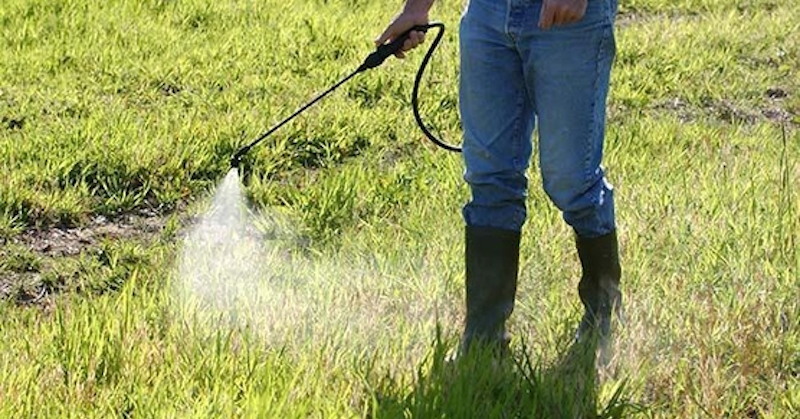Stop Using These Cancer-Causing Products Around Your Pets Immediately
Last updated on
This is an important heads-up for all of you who put chemical pest repellent collars on your pets and/or use pesticide sprays in and around your home.
In March of this year, the International Agency for Research on Cancer (IARC), which is part of the World Health Organization (WHO), reported that glyphosate, the most widely used herbicide in the world, and four organophosphate pesticides are carcinogenic (cancer-causing).1
A summary of the IARC study was published in the journal The Lancet Oncology in May 2015.2 The 17 experts from 11 countries who prepared the report rated two pesticides, tetrachlorvinphos and parathion, as “possibly carcinogenic to humans.” The remaining three, malathion, diazinon and glyphosate, were rated as “probably carcinogenic to humans.”
With the exception of diazinon, for which limited evidence exists in studies of animals, there is sufficient evidence that the remaining four chemicals are carcinogenic to animals. 3
5 Cancer-Causing Pesticides and Herbicides
1. Glyphosate
Glyphosate is a widely used herbicide around the world, and usage has increased with the increase in genetically modified crops. The greatest use of this toxin is in agriculture, but it is also used in forestry, urban, and home applications. Glyphosate has been detected in the air, in water, and in food.
There is evidence of carcinogenicity in humans for non-Hodgkin lymphoma based on several years of studies of agricultural exposure to glyphosate in the US, Canada, and Sweden. Studies also show glyphosate causes DNA and chromosomal damage in human cells.
There is also convincing evidence that glyphosate can cause cancer in animals.
The most well-known product containing glyphosate is Roundup by Monsanto. A comprehensive list of products containing this herbicide can be found at the US Department of Health and Human Services Household Products Database. Also check out Dr. Mercola’s recent article on glyphosate for more information on the dangers of this herbicide and Monsanto’s unprecedented efforts to silence the opposition.
2. Diazinon
Thanks to regulations restricting the spraying of diazinon, this insecticide is in limited use in agriculture and homes in the US and Europe. Studies of this chemical have shown evidence of carcinogenicity in humans for non-Hodgkin lymphoma and lung cancer, as well as DNA and chromosomal damage.
You can find a list of products containing diazinon here. The list includes Ortho Ready Spray Flea & Tick Killer for pets.
3. Malathion
Malathion is another insecticide associated with non-Hodgkin lymphoma and also prostate cancer. Like glyphosate and diazinon, this toxin produces DNA and chromosomal damage, as well as disruption of hormone pathways. It also causes tumors in rodents.
Malathion is used for insect control in agriculture, public health, and in homes. It is produced in substantial volumes across the globe. Exposure in the general population occurs primarily from proximity to sprayed areas, use in homes, and in food.
A list of products containing this insecticide can be found here.
4. Tetrachlorvinphos
Studies of the pesticide tetrachlorvinphos have produced strong evidence of carcinogenicity in animals. This toxin is banned in the European Union, but is still in use in the US on livestock and companion animals, including in flea collars for pets.
According to the Household Products Database, the following pet products contain tetrachlorvinphos:4
- Hartz Advanced Care 1 in 1 Reflecting Flea & Tick Collar for Cats
- Hartz InControl Flea & Tick Cat Spray
- Hartz InControl Reflecting Flea & Tick Collars for Dogs
- Hartz Control Flea & Tick Repellent for Dogs
- Hartz Advanced Care 2 in 1 Reflecting Flea & Tick Collar for Dogs
- Hartz Control Ultimate Flea Collar for Cats
5. Parathion
Parathion, another pesticide shown to be carcinogenic in animals, has fortunately been banned in both the US and Europe since 2003.
Protecting Four-Legged Family Members
Don’t apply pesticides to your yard, and if you use a lawn care service, don’t allow them to use chemicals, either. The same goes for herbicides, and keep in mind that a neighbor’s lawn treatment can potentially contaminate your property and pose a risk to you and your pet.
Don’t allow your pet access to any outdoor space unless you can confirm no pesticides have been used.
If you think your pet has rolled around on chemically treated grass, bathe him as soon as possible. If you’ve walked your dog in a chemically treated outdoor space, give him a foot soak as soon as you get home to flush away any chemical residue that may be clinging to his feet and lower legs.
If you live in a community that applies chemicals to common areas, I recommend “detoxing” a patch of grass by watering the chemicals down into the soil to reduce skin contact after application. Keep your pet on a leash (and on the sidewalk) until you’ve walked to your pesticide-free destination.
When it comes to pest control, remember—keeping your pet’s immune system healthy and strong is the best way to help him fight off parasites as well as disease. A balanced, species-appropriate diet made with organic, non-GMO ingredients is the foundation of your pet’s good health and long life.
Use a safe, natural pest deterrent. Also consider cedar oil (specifically manufactured for pet health), natural food-grade diatomaceous earth, or fresh garlic. Work with a holistic veterinarian to determine a safe amount for your pet’s body weight.
Bathe and brush your pet regularly and perform frequent full-body inspections to check for parasite activity, and insure your indoor and outdoor environments are unfriendly to pests.
Detoxifying Your Pet
Consider periodic detoxification for your pet. The level of environmental exposure to chemicals will dictate the appropriate frequency and type of detox.
For example, if your dog has constant exposure to toxic chemicals all summer, supplying a daily detox protocol is a wise idea. But if your pet’s only source of chemical exposure is heartworm pills, or if you are applying flea and tick chemicals directly on your pet, then offering a detox program the week after each pill or topical treatment makes sense.
This article was originally published on Mercola.com. It is republished here with permission.
Some of the links I post on this site are affiliate links. If you go through them to make a purchase, I will earn a small commission (at no additional cost to you). However, note that I’m recommending these products because of their quality and that I have good experience using them, not because of the commission to be made.



































 JOIN OVER
JOIN OVER
Comments